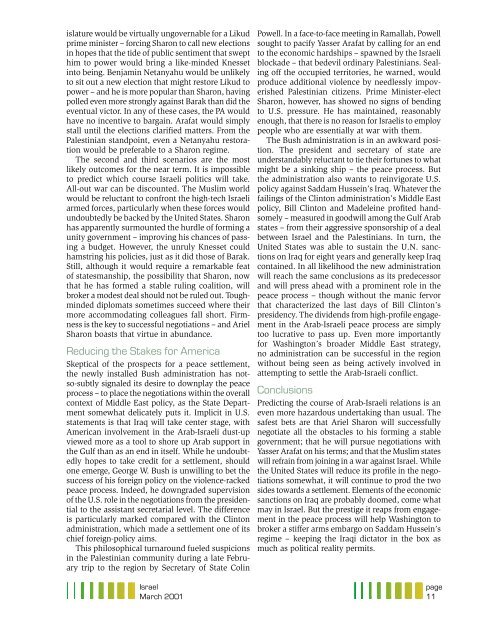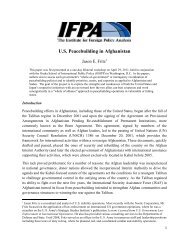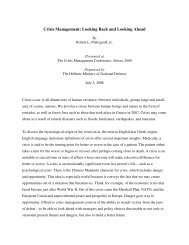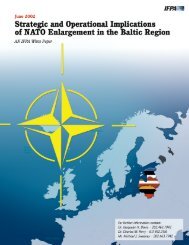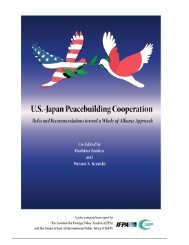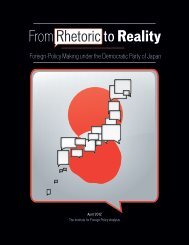March 2001 - Institute for Foreign Policy Analysis
March 2001 - Institute for Foreign Policy Analysis
March 2001 - Institute for Foreign Policy Analysis
You also want an ePaper? Increase the reach of your titles
YUMPU automatically turns print PDFs into web optimized ePapers that Google loves.
islature would be virtually ungovernable <strong>for</strong> a Likud<br />
prime minister – <strong>for</strong>cing Sharon to call new elections<br />
in hopes that the tide of public sentiment that swept<br />
him to power would bring a like-minded Knesset<br />
into being. Benjamin Netanyahu would be unlikely<br />
to sit out a new election that might restore Likud to<br />
power – and he is more popular than Sharon, having<br />
polled even more strongly against Barak than did the<br />
eventual victor. In any of these cases, the PA would<br />
have no incentive to bargain. Arafat would simply<br />
stall until the elections clarified matters. From the<br />
Palestinian standpoint, even a Netanyahu restoration<br />
would be preferable to a Sharon regime.<br />
The second and third scenarios are the most<br />
likely outcomes <strong>for</strong> the near term. It is impossible<br />
to predict which course Israeli politics will take.<br />
All-out war can be discounted. The Muslim world<br />
would be reluctant to confront the high-tech Israeli<br />
armed <strong>for</strong>ces, particularly when these <strong>for</strong>ces would<br />
undoubtedly be backed by the United States. Sharon<br />
has apparently surmounted the hurdle of <strong>for</strong>ming a<br />
unity government – improving his chances of passing<br />
a budget. However, the unruly Knesset could<br />
hamstring his policies, just as it did those of Barak.<br />
Still, although it would require a remarkable feat<br />
of statesmanship, the possibility that Sharon, now<br />
that he has <strong>for</strong>med a stable ruling coalition, will<br />
broker a modest deal should not be ruled out. Toughminded<br />
diplomats sometimes succeed where their<br />
more accommodating colleagues fall short. Firmness<br />
is the key to successful negotiations – and Ariel<br />
Sharon boasts that virtue in abundance.<br />
Reducing the Stakes <strong>for</strong> America<br />
Skeptical of the prospects <strong>for</strong> a peace settlement,<br />
the newly installed Bush administration has notso-subtly<br />
signaled its desire to downplay the peace<br />
process – to place the negotiations within the overall<br />
context of Middle East policy, as the State Department<br />
somewhat delicately puts it. Implicit in U.S.<br />
statements is that Iraq will take center stage, with<br />
American involvement in the Arab-Israeli dust-up<br />
viewed more as a tool to shore up Arab support in<br />
the Gulf than as an end in itself. While he undoubtedly<br />
hopes to take credit <strong>for</strong> a settlement, should<br />
one emerge, George W. Bush is unwilling to bet the<br />
success of his <strong>for</strong>eign policy on the violence-racked<br />
peace process. Indeed, he downgraded supervision<br />
of the U.S. role in the negotiations from the presidential<br />
to the assistant secretarial level. The difference<br />
is particularly marked compared with the Clinton<br />
administration, which made a settlement one of its<br />
chief <strong>for</strong>eign-policy aims.<br />
This philosophical turnaround fueled suspicions<br />
in the Palestinian community during a late February<br />
trip to the region by Secretary of State Colin<br />
Israel<br />
<strong>March</strong> <strong>2001</strong><br />
Powell. In a face-to-face meeting in Ramallah, Powell<br />
sought to pacify Yasser Arafat by calling <strong>for</strong> an end<br />
to the economic hardships – spawned by the Israeli<br />
blockade – that bedevil ordinary Palestinians. Sealing<br />
off the occupied territories, he warned, would<br />
produce additional violence by needlessly impoverished<br />
Palestinian citizens. Prime Minister-elect<br />
Sharon, however, has showed no signs of bending<br />
to U.S. pressure. He has maintained, reasonably<br />
enough, that there is no reason <strong>for</strong> Israelis to employ<br />
people who are essentially at war with them.<br />
The Bush administration is in an awkward position.<br />
The president and secretary of state are<br />
understandably reluctant to tie their <strong>for</strong>tunes to what<br />
might be a sinking ship – the peace process. But<br />
the administration also wants to reinvigorate U.S.<br />
policy against Saddam Hussein’s Iraq. Whatever the<br />
failings of the Clinton administration’s Middle East<br />
policy, Bill Clinton and Madeleine profited handsomely<br />
– measured in goodwill among the Gulf Arab<br />
states – from their aggressive sponsorship of a deal<br />
between Israel and the Palestinians. In turn, the<br />
United States was able to sustain the U.N. sanctions<br />
on Iraq <strong>for</strong> eight years and generally keep Iraq<br />
contained. In all likelihood the new administration<br />
will reach the same conclusions as its predecessor<br />
and will press ahead with a prominent role in the<br />
peace process – though without the manic fervor<br />
that characterized the last days of Bill Clinton’s<br />
presidency. The dividends from high-profile engagement<br />
in the Arab-Israeli peace process are simply<br />
too lucrative to pass up. Even more importantly<br />
<strong>for</strong> Washington’s broader Middle East strategy,<br />
no administration can be successful in the region<br />
without being seen as being actively involved in<br />
attempting to settle the Arab-Israeli conflict.<br />
Conclusions<br />
Predicting the course of Arab-Israeli relations is an<br />
even more hazardous undertaking than usual. The<br />
safest bets are that Ariel Sharon will successfully<br />
negotiate all the obstacles to his <strong>for</strong>ming a stable<br />
government; that he will pursue negotiations with<br />
Yasser Arafat on his terms; and that the Muslim states<br />
will refrain from joining in a war against Israel. While<br />
the United States will reduce its profile in the negotiations<br />
somewhat, it will continue to prod the two<br />
sides towards a settlement. Elements of the economic<br />
sanctions on Iraq are probably doomed, come what<br />
may in Israel. But the prestige it reaps from engagement<br />
in the peace process will help Washington to<br />
broker a stiffer arms embargo on Saddam Hussein’s<br />
regime – keeping the Iraqi dictator in the box as<br />
much as political reality permits.<br />
page<br />
11


